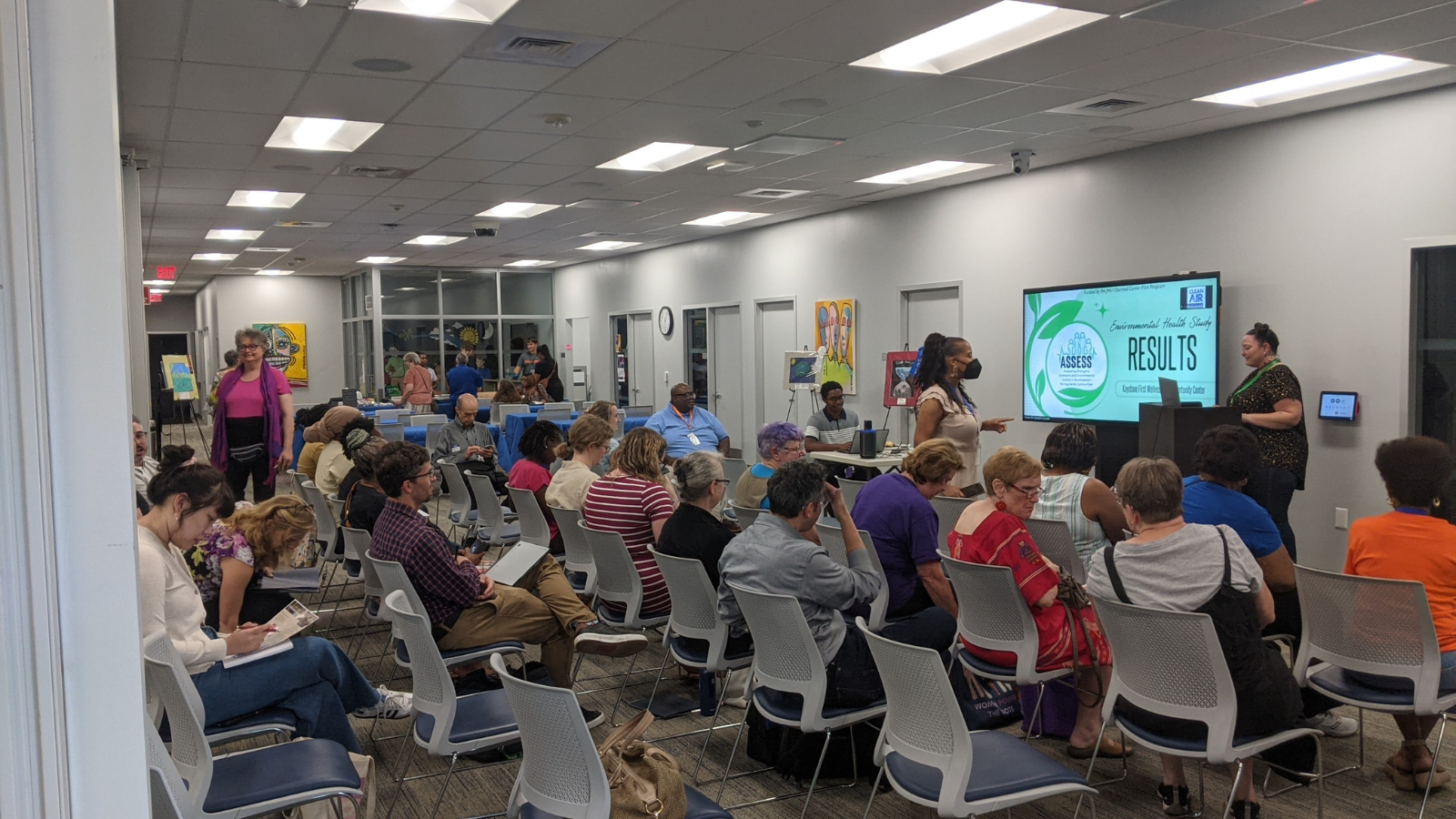Clean Air Council and Partners Release Community Environmental Health Study Key Findings

On Tuesday evening, July 30th, over 60 residents and key stakeholders gathered in-person at the Keystone First Wellness and Opportunity Center in Chester, with another 30 residents and key stakeholders joining via Zoom, to learn the key findings and recommendations of the ASSESS Community and Environmental Health Study of southeastern Delaware County.
The report included several key recommendations for policy makers such as:
- Enact environmental justice legislation that addresses and mitigates cumulative impacts.
- Prioritize community engagement, inclusion, and transparency in any decision-making processes that affect fenceline residents before facilities and infrastructure are proposed.
- Implement or expand air, odor, and noise monitoring programs in Southern Delaware County and develop mitigation plans as needed.
- Enact policies & programs that reduce pollution, crime & violence, and food insecurity; improve access to mental health services and green community spaces.
The ASSESS study is a collaboration of Marcus Hook Area Neighbors for Public Health, Clean Air Council, Johns Hopkins University, and community co-investigators. The study utilized a Community Based Participatory Research (CBPR) model in which residents were full partners in the design, implementation, evaluation, and publication of the study results.
The study aimed to address the impacts of pollution on physical, mental, and environmental health in southeastern Delaware County communities, along the I-95 corridor from Marcus Hook up through Eddystone. The study involved both a survey to collect data and a series of focus groups to better understand residents’ lived experiences. Both the survey questions and focus group questions were designed with input from community co-investigators, such that the study itself was tailored to the needs and issues that pertain to the community.
The report offered several key recommendations for policymakers, local leaders, researchers, and community organizers. One recommendation that got a lot of attention at the meeting was to push forward Cumulative Impacts Environmental Justice legislation that has already been introduced in both the House and Senate in Pennsylvania, but which to date has not moved forward.
“The ASSESS Study represents a significant opportunity for all community stakeholders—including elected officials, citizens, and activists—to work together,” said Thom Nixon, community co-investigator. “As highlighted in our town meeting on July 30th, the study provides a basis for advocating for new local and state-level laws addressing the cumulative impacts of multiple industries on overburdened communities. These industries, including petrochemical plants, have long histories of pollution affecting our land, air, and water in Southeast Delaware County.”
During the presentation, community co-investigators Thom Nixon, Kearni Warren, Echo Alford and Eve Miari, along with JHU researcher Sara Lupolt, shared some of the key findings of the study:
- Residents of southern Delaware County are overburdened by a combination of both chemical and non-chemical stressors. These “cumulative burdens” harm physical, mental, and environmental health in a myriad of ways.
- Symptoms of physical and mental health problems are far more widespread in the community than what has been diagnosed or previously documented. Residents are making a clear connection between their health impacts and the pollution, odors, and noise in their environment.
- Children in southern Delaware County are particularly vulnerable to the impacts of pollution, as well as the cumulative impacts of pollution and non-chemical stressors, such as economic insecurity, lack of access to affordable housing, food insecurity, violence and crime. Many more children in southern Delaware County experience symptoms such as coughing and wheezing than have medically documented asthma diagnoses.
- 95% of survey participants reported noxious odor issues that interfered with daily activities and quality of life.
You can see the full report for all key findings and additional recommendations here.
If you missed the meeting, you can still view the presentation slides.
What’s Next?
In the coming months, Marcus Hook Area Neighbors for Public Health and Clean Air Council will be working to develop an advocacy plan that will take the findings of the ASSESS study and put them into action. Please join us!
MHANPH meets regularly to discuss and address air quality issues, watershed protection, climate resilience, and environmental health in southern Delaware County. You can follow MHANPH on Facebook and Instagram and get on the email list to find out about upcoming events!
Clean Air Council, in partnership with MHANPH, is also in the process of launching an air monitoring program that will install outdoor air monitors at residents’ homes to collect real-time air quality data. Participants will be compensated for hosting a monitor. Check out https://cleanair.org/airmonitor for more information on the Council’s air monitoring program.

